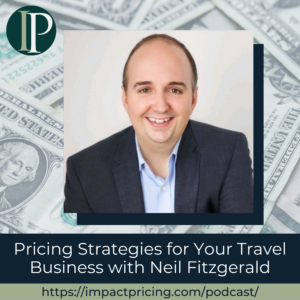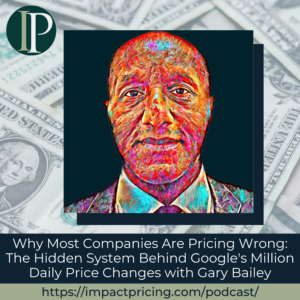Neil Fitzgerald is an experienced, driven, and accomplished pricing and revenue professional, with a wealth of experience while working for leading, high-profile companies. Proven in exceeding all bottom-line expectations. Experienced in cruise, hotel and vacation rental industries.
In this episode, Neil shares the crucial role of pricing in the travel industry and its impact on the bottom line success. He emphasizes that achieving pricing goals is not solely reliant on AI, highlighting the importance of collaboration and building relationships with other stakeholders in the company.
Podcast: Play in new window | Download
Why you have to check out today’s podcast:
- Explore effective pricing strategies for one-time opportunities in the travel industry to optimize revenue
- Learn to strike a balance between short-term gains and long-term profitability, ensuring your pricing decisions don’t compromise future success
- Discover the importance of guiding customers on a journey, expediting their consideration of revenue and pricing management
“Don’t assume that everyone else in your business understands what you’re doing. So, take the time to listen to other people, and take the time to communicate and collaborate with the other people in your teams and the other stakeholders in your business, and take them on the journey.”
– Neil Fitzgerald
Topics Covered:
01:20 – How Neil get into pricing
03:02 – How does pricing for travel differ from any other pricing?
04:51 – The challenge that comes with pricing the travel industry
07:37 – Pricing strategies in other industries that can work best in the travel industry
09:53 – Neil’s thoughts on Mark’s suggested limited time pricing offer for a cruise ship basing it from Chipotle’s food pricing
11:59 – Discussion about one pricing strategy that Disney implemented and had to be discontinued
13:42 – Pricing insights from crowded airport lounges nowadays gleaned from Mark’s experience
16:11 – How does he get people sold to the idea of revenue management
18:35 – Talking about AI and pricing algorithms
20:50 – Neil’s best pricing advice
Key Takeaways:
“It is interesting in travel, when you do try and do those one-off opportunities to get a higher price point, you’ve got to be careful that it really, really is exclusive and it isn’t so broad because then you can create too much demand.” – Neil Fitzgerald
“It’s an interesting business case for pricing managers about how Disney built out this fantastic product for the Star Wars hotel, charged thousands of dollars a night, and then has had to close it in a very short time period because they couldn’t get the revenues that they were expecting.”– Neil Fitzgerald
“I always think when it comes to pricing, even when you’re more on the revenue management side and you are looking at your supply and demand patterns, you do have to have an awareness of the overall cost basis as well, because it can be quite easy if you’re not careful to overprice.” – Neil Fitzgerald
“It’s going to be an interesting case about how airlines effectively raise, find ways of charging guests more so that they’re reducing the demand without upsetting the most low guests.” – Neil Fitzgerald“We can’t produce demand out of thin air and we can’t produce higher margins out of thin air. We have to take people on the journey.” – Neil Fitzgerald
People /Resources Mentioned:
- Chipotle: https://www.chipotle.com/home
- Virgin Voyages: https://www.virginvoyages.com
- Green Bay Packers: https://www.packers.com
Connect with Neil Fitzgerald:
- LinkedIn: https://www.linkedin.com/in/neil-fitzgerald-55122591/
- Email: [email protected]
Connect with Mark Stiving:
- LinkedIn: https://www.linkedin.com/in/stiving/
- Email: [email protected]
Full Interview Transcript
(Note: This transcript was created with an AI transcription service. Please forgive any transcription or grammatical errors. We probably sounded better in real life.)
Neil Fitzgerald
Don’t assume that everyone else in your business understands what you’re doing. So, take the time to listen to other people, and take the time to communicate and collaborate with the other people in your teams and the other stakeholders in your business, and take them on the journey.
[Intro]
Mark Stiving
Welcome to Impact Pricing, the podcast where we discuss pricing, value, and the consistent relationship between them. I’m Mark Stiving. Our guest today is Neil Fitzgerald, and here are three things you want to know about Neil before we start. He is the Director of Pricing and Revenue Management at Lindblad Expeditions. Oh, that’s right. I forgot I was going to ask him a question about that. He was a pricing and revenue manager at Princess Cruises for a long time. Now tell me, we’re not all curious. And believe it or not, he was a city councilman in the UK, so he was actually a politician. I’m so glad that he left that life. Welcome, Neil.
Neil Fitzgerald
Thank you, Mark. How are you?
Mark Stiving
I’m doing fabulous today. How’d you get into pricing?
Neil Fitzgerald
So, I went to university to study history and I was working part-time in a suit shop tailoring people waiting for my degree. And I went on holiday and I came back and found out the shop was going to close down. So I was like, what am I going to do? And I’d actually worked in the call center before, so I’d got a job working for P and O Cruises in the UK, just making bookings. And I got my degree results through, and there was the opportunity to go on a training scheme program to become a manager in customer services. And I was like, I enjoy this, but I don’t know if I want to be in customer service. And one of the managers there said, well, my husband’s a commercial manager at Ocean Village Holidays, which is a cruise brand that was in the UK that’s now defunct.
She was like, maybe you want to have a chat with him if you want to do the more business side of things. So I had a chat with him, and so I joined as an assistant and I was managing the ship inventory and the cabin allocations and what have you. And I just really enjoyed being involved. And then I started doing last minute pricing to fill the beds last minute on the ship. Then I did strategic pricing and then campaign pricing and campaign management and just worked my way through and I learned on the job.
Mark Stiving
Nice. Well, don’t we all fall into the pricing world, those of us who are in it? So, you said you were in a pricing conference last week, and I don’t know if this is a fair question because you’ve been in the travel industry most of your career. So how do you think pricing for travel is different from pricing for anything else?
Neil Fitzgerald
So it was interesting because the conference was dominated by AI and pricing algorithms and data science. And that’s something which in my industry we’ve been using for years. I mean, I was involved in a project to get a new price in a revenue management system. And we were talking about that in 2016. And this went live in ’17, ’18. And so we were talking about price algorithms and elasticity demand models a while ago. And I feel as if in the last couple years, particularly since COVID, other businesses have now caught up to that. And so I found that really interesting because I sat there and I’m like, yeah, I know we’ve been talking about all of these things. And it’s interesting because in my role now, this is a new role. My company didn’t have a pricing director before, so it’s new. But I know there’s a lot of people who are building out these pricing systems and trying to sell companies these pricing systems that are going to take care of the day-to-day pricing. And I always caution on that. I don’t know if you do too because I say that pricing is really, it’s the art and the science. You can’t leave it to a computer and you can’t leave it to data scientists. You have to have an understanding of the overall business too.
Mark Stiving
Yeah. I think it makes sense that you have to know why things are happening. Yeah. I know a lot of the AI companies or the pricing companies that are doing AI are trying to do something they’re calling transparent AI or something to that effect so they understand what’s going on. But it seems to me that the number one difference in your world versus almost every other industry is you’ve got a perishable good, right? As soon as the cruise ship leaves the dock, the bed is empty, or as soon as the airplane leaves the ground, the seat is empty.
Neil Fitzgerald
Yep.
Mark Stiving
And so that is a challenge for you.
Neil Fitzgerald
Yeah, it is. And one of the interesting things is from a customer service perspective or from a sales and marketing perspective, sometimes if the price fluctuates more, there can be a little bit of uncertainty about that. Well, if the price goes up, are people still going to book it? Or if the price goes down, are people going to ask for a refund? Are they going to get upset that the products got cheaper? And what I say to people is, if you’ve ever been to happy hour in the USA, that’s revenue management. Restaurants do revenue management. It might not be as clear as an airline changing the price each day. But if you go to a bar between three and five, you generally get a discount compared to if you dine at seven o’clock at night.
Now, you don’t find restaurants doing the surcharge at seven o’clock at night, but they’re making it cheaper during different times. You go to a movie theater and the matinee performance in the afternoon is cheaper than if you go on a Saturday or Friday night. There’s other consumer products and there’s other consumer experiences doing revenue management pricing out there, but it may not just be as apparent as it is within travel. And then I find within it as well that different travel brands have different ways of handling it. And I reference the airlines as well coming out of COVID. They’ve also been doing revenue management and pricing strategy through the changing in their loyalty programs. Delta’s got itself into a mess in the last week or so over, it’s changed to its loyalty program. That’s all price and the revenue management, yet you’re not changing the price of the ticket flying from LA to New York. But fundamentally you are changing the overall price and the value perception to the consumer, whether you do that through a loyalty program or whether you do that through the price of the airline ticket. And I think that’s one of the big differences between us and some other consumer products out there as well.
Mark Stiving
Yeah, I think I agree that a lot of companies are doing dynamic pricing and I guess if you think about a bar and happy hour, you’ve got a chair there, and if that chair is empty, that really is a perishable good, right? You didn’t have someone sitting there drinking. Yeah. Even though I’ve never really thought of it that way before. Right. that truly is perishable. One of the things I do all the time is I look at different industries and I see what they do for pricing, and then I say, well, how does that apply over here? How does that apply over there? And why is that working? And why isn’t that working? Have you seen any really fascinating pricing techniques from other industries or other perishable goods industries where you could say, oh, that would work really nicely in cruise lines or in a space that I’m working in?
Neil Fitzgerald
Yeah. So I think of the quick service restaurant model as well. I think of somebody like Chipotle. Chipotle brings in a particular burrito that’s only available for a limited time, right? And so they do an upcharge for it. So I just had one earlier, the carne asada. It’s delicious, but it’s more money than the regular steak. It’s a form of price in revenue management. I think within travel, that’s something which is harder to do. So for a ship, it’s very hard to suddenly pick the ship up and move it to another part of the globe and to offer something else. It’s very hard if you’ve got a hotel in the middle of New York, you can’t pick the hotel up and move it. So if you think back to the last couple of years, and I used to be in vacation rentals before this current role you would find within vacation rentals that you had some destinations that did very well during COVID, beaches, mountain results, smaller towns and what have you.
Yet your inner cities and your downtowns were, there was a lot lower demand. So everyone started buying vacation rentals in Tennessee and the Smoky Mountains and what have you and the outer banks in North Carolina. And then this year people have been freaking out and it’s been all over for social media about this Airbnb bust and how occupancy and pricing’s down. So I think within travel and hospitality, because the assets are kind of fixed, it’s harder to move it, it’s harder to come out with the new product very, very quickly for that limited time. It’s a lot harder to do. But it’s an interesting concept. I mean, I’ve seen a couple of travel companies. Yeah.
Mark Stiving
Do you know what, what came to my mind, what jumped to my mind when you were talking about the burrito and then you said, is there a limited time offer we could offer in a cruise ship? And I don’t know if this really drives business or not, but I often hear people who are popular saying, we’re putting on a cruise on this day, come join our cruise. And in a way that’s a limited time offer. You’re going to go cruise with someone that you like, you listen to. And so you could imagine that is potentially more expensive or we’re not giving discounts not because they really want to cruise, but because they want to hang out with someone that they follow.
Neil Fitzgerald
Yeah. And it does happen. I mean, it can be a little bit challenging operationally. So for example, Virgin Voyages have got a partnership with Jennifer Lopez. Well you’re on a ship with 2,000 other people. It’s not like JLo’s going to meet 2,000 people in a day. Right? But yeah, that concept of those extra experiences is something which the travel industry continues to redefine. And whether that’s meeting JLo, or I’ve seen ones, I’m a Green Bay Packer fan. I’ve seen ones where you go on a cruise and you get to meet former Green Bay Packer players. So I’ve seen different cruises out there that are doing that. I think it’s an area of interest for it as well as when you offer those more exclusive experiences, if it’s too broad, then you’re going to get a guest impact and go back to the airlines. And if you go to an airport lounge, they’re heaving because so many people now got access to the lounge. Now they’re finding ways of increasing the pricing of the lounges to lower the demand. And so it is interesting in travel, when you do try and do those one-off opportunities to get a higher price point, you’ve got to be careful that it really, really is exclusive and it isn’t so broad because then you can create too much demand. And the flip side, not to go on too much longer over it is Disney and the Star Wars hotel. You know, it’s an interesting business case for pricing managers about how Disney built out this fantastic product for the Star Wars hotel, charged thousands of dollars a night, and then had to close it in a very short time period because they couldn’t get the revenues that they were expecting.
Mark Stiving
Yeah. So I haven’t researched that a lot. But wouldn’t you say that it was simply overpriced? I mean, I would say that it was a phenomenal idea. It added value. They could get a margin above and beyond what an average hotel would be in the Disney space, but they’re charging four or five times an average hotel in a Disney space. And I’m not sure that people could say, it’s not worth that much more.
Neil Fitzgerald
Yeah, it’s interesting. That’s something which if you think of some other pricing people got the quick service restaurant model, they’ve got some products where they’ve got a very small margin between the cost of the actual menu item and the cost they’re selling it at. And it was interesting reading up about this where there was a higher cost base because a lot of the staff were actors and they were paying them a decent wage and the amount of staff that were involved in producing this Star Wars experience. And so I always think when it comes to pricing as well, even when you’re more on the revenue management side and you are looking at your supply and demand patterns, you do have to have an awareness of the overall cost basis as well, because it can be quite easy if you’re not careful to overprice, just like Disney do. The flip side is it’s quite easy to, unless you’ve got a hand at all the data, it’s quite easy to underprice and like the airline lounges have, and then you’ve got too many people in for a lounge.
Mark Stiving
Yeah. So, by that completely, what comes to my mind is most companies when they’re building brand new products, really should be focused on what’s the experience, what’s the price, what’s the product? And then can I build it for that? Right? So it isn’t, hey, this is what it costs me after I built this, so I need to charge this much money. It’s really, should I ever have gone into this business in the first place? Did that make sense?
Neil Fitzgerald
Yeah.
Mark Stiving
And I think because since you brought up the lounges several times lately, and I want to know more about what you know mostly because I travel a lot and I sit in those lounges and they truly have gotten way more crowded than they used to be. Yeah. Now it doesn’t feel like they lowered the price or did they lower the price?
Mark Stiving
So I think they’ve lowered the price from the point of view that suddenly you had more co-branded credit cards, and so you had more people with offers out there that if you spend X thousands of dollars, you suddenly got X thousands of points and therefore you qualified. And so I’ve noticed it where they’ve started to reduce it, they’ve started to try and reduce the demand now by charging for a guest, while some lounges used to be able to bring in a guest for free, or they’re up in the qualification now of the number of points you need to earn per year to get access to the lounge. And so it is a different price inside of it. It’s more about how so many people now are buying up on the airplane combined with the amount of credit card offers out there as well.
That’s creating too much demand compared to the number of people who can staff the airport down at any one time. And then the capacity of it. And it goes back into the hotels in downtown major cities. You couldn’t pick up the hotel during COVID and stick it on the beach. Well you can’t build an airport down very quickly to cope with the demand. And so it’s going to be an interesting case about how airlines effectively raise, find ways of charging guests more so that they’re reducing the demand without upsetting the most low guests. And I think that is something where it’s really easy as the pricing person to look at the numbers, but then forget about the customer service and the guest experience as well, and the guest impact. Because if you’re not careful Yeah. Short term, you can raise your price in, and it looks good on your balance sheet, but if you upset too many of your low guests and your low customers and they don’t return, then you’re increasing prices a mirage because two years later you don’t have the demand anymore that you were expecting.
Mark Stiving
Yeah. I think that’s absolutely true. We often take the short-term gain and miss out on the long-term situation problem, however we want to look at that. So yeah. One of the things I always ask, I’m sure by now my listeners know this, I always ask, what is it that you’re passionate about? One of the things you said was bringing pricing and revenue management to new organizations. And I find that fascinating. How do you bring revenue management? Is it, you are walking in the door and someone just isn’t doing it today? And so how do you convince them this is something we need to do and we need to get more people on board thinking this way?
Neil Fitzgerald
Yeah, it’s very easy. It’s very easy to go in with a load of numbers and a load of spreadsheets or a PowerPoint deck and walk people through it. But if people aren’t used to the idea of price change, regular price changes, or different revenue management techniques, whether upselling X or Y, you really have got to spend time listening to the people in the business about what, how things are working right now. And you’ve got to take them on a journey. And one of the interesting things that I had was at Princess, I was involved in the commercial strategy when we started opening up our offices out in Asia. And so that’s a very different market than what we’re used to in North America and the UK. And then suddenly you are operating in a market that isn’t used to significant price changes and you are working with people who are brand new.
And so we spent a lot of time agreeing what the key benchmark was for success. So we spent a lot of time on that. And then we spent a lot of time essentially talking to people and listening and building out a strategy that doesn’t sound overwhelming. So it got to the point of, right, we need these numbers of people to book a cruise this week. We need this number of people to book a cruise next week. And at the end of the month, did we get the target for the month? Oh, we got the target. Fantastic. Okay, can we carry on getting the target next month? Great. But if we didn’t get the target, okay, what’s unrealistic? Why didn’t we get the number of people we were expecting to book? Is it because somebody else is cheaper? Is it because of the economy, whatever it is?
And then refining it so that you’re constantly kind of refining and re-forecasting for the target in terms of how many bookings you want. So how many guests you want purchasing your products, and then your average revenue for your products as well. And keeping that in lockstep with each other. So it’s that constant communication, that constant refinement so that people feel motivated because now I mentioned the AI thing as well. I think sometimes people who aren’t used to pricing managers or revenue management people, they think that we can wave a magic wand. And as you know, like we can’t produce demand out of thin air and we can’t produce higher margins out of thin air. We have to take people on the journey.
Mark Stiving
Yeah. In fact, I was going to ask, isn’t everything that you just described what AI is supposed to do for us?
Neil Fitzgerald
Yeah, to an extent. I mean, I’ve been involved in projects where we’ve had pricing algorithms and it’s great when it works. If you’ve got that historical information and you know your price elasticity, you change your price by X percentage up or down, and you’re going to either get more demand or less demand. But that’s incredibly challenging in travel and hospitality since COVID, because the demand patterns are all over the place. There’s a lot of travel companies where they had to counsel people, but they tried to cling on to those people’s money. So essentially, hey, if you stick with us, you can come with us later on. And the demand patterns are all over the place when it comes to hotel and vacation rentals because people weren’t staying in the city. So staying in the mountains and the beaches and then demand patterns are over the place with the airlines because it depends on which part of the globe opened earlier or later. And so our historical booking patterns aren’t as predictable and neither are the price and elasticity models as they are now, because it’s going to take a while for COVID and then inflation to settle through the system before I think people can really trust pricing algorithms. Again, I think people are going to have to really keep an eye on them and put in those some fail safe, whether that’s looking at it daily, whether that’s building some kind of coding in the AI that says, okay, you can do X amount and then you’ve got to stop and it’s got to be reviewed before you go and do X amount of price changes again. If that makes sense.
Mark Stiving
Yep. I’m sure I knew that, but I’d never thought through the fact that when we have a huge shock to the market like the pandemic, then AI essentially doesn’t know how to handle it. Because it’s never been trained on it before. And so now we’re back to manual. Can we think through this? Are we making good decisions? So that was really an interesting observation. So, hey Neil we’re running out of time. We’re by the way, we’re also having tech issues, but I think we’re going to get over that. Let me ask the last question, though. What is one piece of pricing advice you would give our listeners that you think could have a big impact on their business?
Neil Fitzgerald
Don’t assume that everyone else in your business understands what you’re doing, so take the time to listen to other people and take the time to communicate and collaborate with the other people in your teams and the other stakeholders in your business and take them on the journey.
Mark Stiving
Yeah, I absolutely love that answer. I think that we don’t listen enough to other people in other departments. And so the more we listen, the more we can actually help them achieve their goals. And they’ll like us and help us achieve our goals. So, I think that makes a ton of sense.
Neil Fitzgerald
Definitely.
Mark Stiving
Neil, thank you so much for your time today.
Neil Fitzgerald
You’re so welcome.
Mark Stiving
If anybody wants to contact you, how can they do that?
Neil Fitzgerald
Sure. Find me on LinkedIn, Neil Fitzgerald. Your people are welcome to email me. It’s N-E-I-L-F, all lowercase at [email protected].
Mark Stiivng
Excellent. And to our listeners, thank you so much for your time today. If you enjoyed this, would you please leave us a rating and a review? And if you have any questions or comments about the podcast or pricing in general, feel free to email me, [email protected]. Now, go make an impact!
















